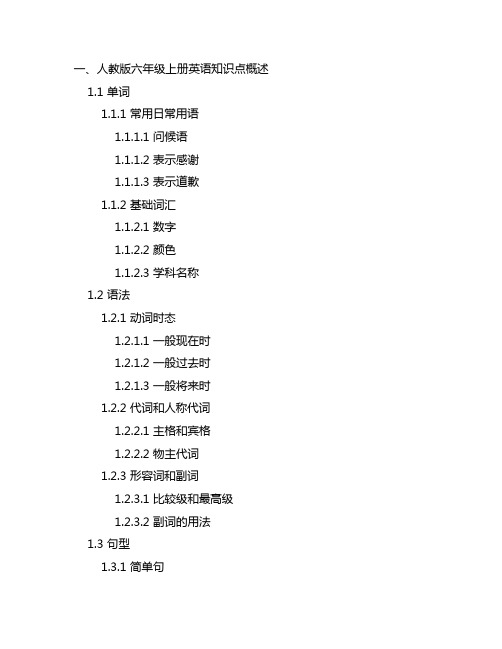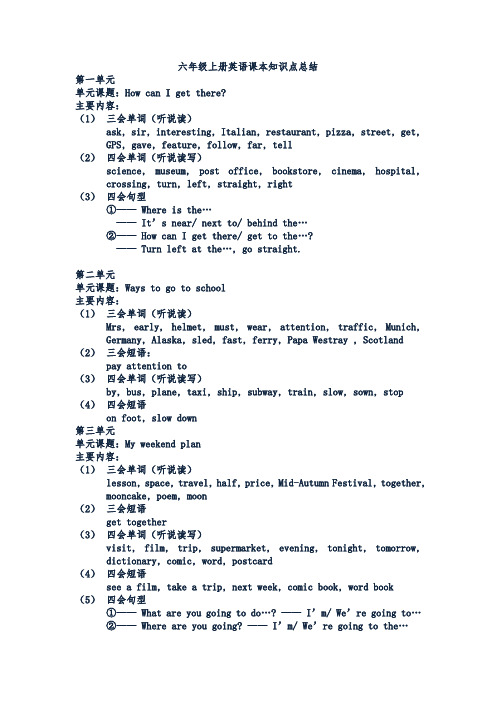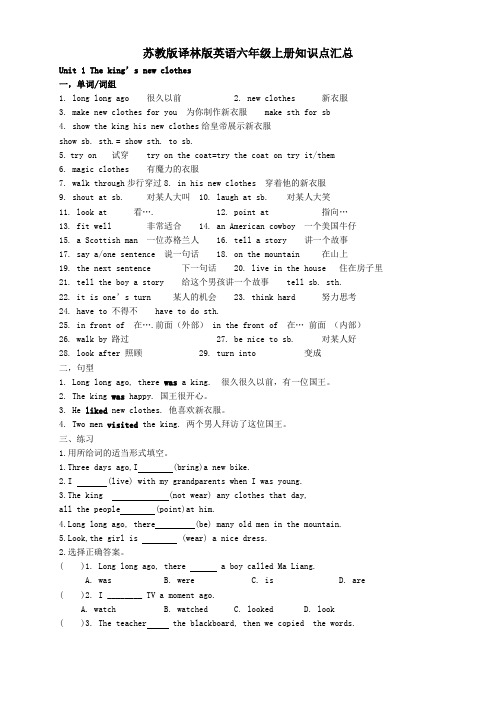六年级英语上下册知识点总结
人教版译林版英语六年级上下两册知识点汇总整理归纳

人教版译林版英语六年级上下两册知识点汇总整理归纳一、词汇1. 常用动词:be, have, do, like, want, eat, play, go, see, watch, listen, read, write, speak, tell, buy, make, take, give3. 常用形容词:big, small, tall, short, thin, fat, long, short, happy, sad, angry, tired, hungry, thirsty, busy, quiet, loud, heavy, light4. 常用副词:very, too, well, badly, slowly, quickly, always, never, sometimes, often, usually, now, soon, yesterday, today, tomorrow二、语法1. 一般现在时:表示经常性的动作或状态- 主语 + 动词原形- 示例:I study English every day.2. 现在进行时:表示正在进行的动作- 主语 + am/is/are + 现在分词- 示例:He is playing football now.3. 一般过去时:表示过去的动作或状态- 主语 + 动词过去式- 示例:They went to the park yesterday.4. 一般将来时:表示将来的动作或状态- 主语 + will + 动词原形- 示例:I will visit my grandparents next week.5. 祈使句:表示命令、请求、建议- 动词原形 + 其他- 示例:Please close the door.6. 形容词比较级:表示两个事物的比较- 主语 + be + 形容词比较级 + than + 其他- 示例:My sister is taller than me.7. 数词:表示数量- 示例:two apples, three books三、口语表达1. 问候语:Hello! Hi! Good morning! Good afternoon! Good evening!2. 自我介绍:My name is [name]. I am [age] years old.3. 询问年龄:How old are you?4. 询问姓名:What's your name?5. 询问感受:How are you? I'm fine/good/happy/sad.6. 道歉:Sorry.7. 感谢:Thank you. Thanks.8. 请求:Please + 动词原形.9. 邀请:Would you like + 动词原形?10. 表达喜欢:I like + 名词/动词-ing.11. 表达不喜欢:I don't like + 名词/动词-ing.12. 表达能力:I can + 动词原形.13. 询问价格:How much is it?14. 表达时间:What time is it?15. 表达日期:What's the date today?16. 询问天气:What's the weather like today?17. 表达喜怒:I'm happy/angry/sad.四、阅读理解1. 阅读短文,回答问题:根据短文内容选择正确的答案。
pep六年级英语上下册知识点总结

六年级上册英语知识点总结Unit 1 How can I get there?一:重点单词和短语Science科学, museum博物馆, post office, bookstore, cinema, hospital ,tasty, buy, London Eye伦敦银, stomach胃 ,crossing十字路口, turn left, turn right,go straight=walk straight直走.next to紧挨着/与...相邻, far from(离。
.。
远),near在。
.。
附近 ,behind(在。
后面) , in front of(在。
前面),between…and…(在。
和..。
之间)二:按要求写单词:hot(反义词)cold , cool(反义词)warm, too(同音词)to/two can not(缩写)can’t right (反义词)left/wrong buy(同音词)by/bye sea(同音词)see first(基数词)one four(序数词)fourth did (原形)do /does three(序数词)third give(过去式)gave三:重点句型分析1。
Where is the museum shop?此问句是由特殊疑问词where 引导的一个特殊疑问句, where意为“在哪里,到哪里",用来询问地点, 放在句子的开头。
询问“某人或某物在哪里”的基本句型是:“ Where +is/are+ 主语?”, where is 后接名词或代词的单数形式, where are 后接名词或代词的复数形式。
表示地点的词:museum博物馆,post office邮局, bookstore书店, cinema电影院, hospital医院 restaurant餐馆bank银行 bus stop公交车站lake湖 library图书馆zoo动物园 school学校 park公园 garden花园 hotel旅馆2。
人教版六年级上册英语知识点汇总

一、人教版六年级上册英语知识点概述1.1 单词1.1.1 常用日常用语1.1.1.1 问候语1.1.1.2 表示感谢1.1.1.3 表示道歉1.1.2 基础词汇1.1.2.1 数字1.1.2.2 颜色1.1.2.3 学科名称1.2 语法1.2.1 动词时态1.2.1.1 一般现在时1.2.1.2 一般过去时1.2.1.3 一般将来时1.2.2 代词和人称代词1.2.2.1 主格和宾格1.2.2.2 物主代词1.2.3 形容词和副词1.2.3.1 比较级和最高级1.2.3.2 副词的用法1.3 句型1.3.1 简单句1.3.1.1 肯定句1.3.1.2 否定句1.3.1.3 疑问句1.3.2 复合句1.3.2.1 并列句1.3.2.2 定语从句1.3.2.3 状语从句二、人教版六年级上册英语知识点详解2.1 单词2.1.1 常用日常用语2.1.1.1 问候语问候语是指在英语日常交际中用于打招呼和示好的常用词汇,包括Hello、Hi、Good morning、Good afternoon等等。
2.1.1.2 表示感谢表示感谢的常用词汇有Thank you、Thanks a lot、Thank you very much等,用于表达对别人的帮助或礼物表示感激之情。
2.1.1.3 表示道歉表示道歉的词汇包括I'm sorry、Excuse me、Pardon等,在日常生活中,用于向别人道歉或请求对方让步的场合。
2.1.2 基础词汇2.1.2.1 数字数字是英语基础词汇的重要部分,包括基本的数字表达方式和计量单位,如one、two、three等,以及hundred、thousand等。
2.1.2.2 颜色颜色是描述事物外观的重要词汇,在日常交流中也经常用到,包括red、blue、yellow等常见颜色词汇。
2.1.2.3 学科名称学科名称涉及到人们日常生活和学习工作的方方面面,包括mathematics、music、art等,是学习英语时必须掌握的词汇。
人教pep版六年级下册英语全册重要知识点总结

人教pep版六年级下册第一单元单元重要知识点总结四会单词:tall—taller更高的short—shorter 更矮的strong—stronger更强壮的small—smaller (体型)更小的old—older 年龄更大的young—younger 更年轻的big—bigger更大的heavy—heavier 更重的long—longer 更长的thin—thinner 更瘦的四会句型:How tall are you? 你有多高?I’m 164 cm tall. 我164 厘米高。
You’re shorter than me. 你比我矮。
You’re 4 cm taller than me.你比我高4厘米。
How heavy are you? 你有多重?I’m 48 kg. 我48千克。
应该掌握的知识点:1.表示两者之间有所比较时,句子中的形容词要用比较级形式。
形容词变为比较级的变化规则:(1)一般情况下,在形容词的词尾直接加er。
如: tall—taller short—shorter.(2)以字母e结尾的形容词,在词尾直接加r,如:nice—nicer late—later(3)以重读闭音节结尾,且结尾只有一个辅音字母的词,先双写这个辅音字母,再加er.如:big—bigger thin—thinner fat—fatter(4)以辅音字母加y结尾的双音节形容词,先变y为i , 再加er。
如:easy—easierheavy—heavier funny—funnier.形容词比较级的变化口诀:原级变为比较级,通常er加上去。
若是结尾辅元辅,辅音双写要牢记。
辅音加y结尾时,把y变i 是必须。
原级若以e结尾,直接加r不后悔。
2.部分形容词比较级的不规则变化:good—better well—better bad—worsebadly—worse many—more much—more little—less far—farther3.同义句:How tall are you?=What’s your height?How heavy are you?=What’s your weight?4.以How开头的问句(仅限小学阶段):How are you? 问身体状况。
知识点总结(知识清单)-2024-2025学年外研版(三起)英语六年级上册

外研版(三起)六年级英语上册单元知识点Module 1一、短语:1、the Great Wall长城2、visit the US拜访(参观、游玩)美国3、in New York在纽约4、look at 看...5、a picture of... 一张....图画(相片)6、tell me more about...多给我讲点关于...7、how long多长8、It`s about ...它是大约(关于)9、twenty thousand kilometres long 两万千米长10、tell me something about…告诉我关于...的事11、how big 多大12、eight million people 八百万人13、twenty million people 两千万人14、be great 太棒了15、an animal 一只动物16、in the east of… 在...的东部17、in the west/south/north of … 在...的西/南/北部18、San Francisco 旧金山19、a (big) map of... 一(大)张...地图20、lots of=a lot of=many/much 许多21、from...to.. 从....到......22、a big country一个大国23、every day and night 每日每夜二、句子1、These postcards are great ! 这些明信片真棒!Yes, they are. 是的,它们是。
2、Tell me more about the Great Wall.多给我讲点关于长城的3、How long is it? 它有多长?It’s more than twenty thousand kilometres long. 它有两万多千米长。
4、How big is it? 它有多大?It has got more than eight million people.它有八百多万人口。
六年级上册英语课本知识点总结(最新最全)

六年级上册英语课本知识点总结第一单元单元课题:How can I get there?主要内容:(1)三会单词(听说读)ask, sir, interesting, Italian, restaurant, pizza, street, get,GPS, gave, feature, follow, far, tell(2)四会单词(听说读写)science, museum, post office, bookstore, cinema, hospital,crossing, turn, left, straight, right(3)四会句型①—— Where is the…—— It’s near/ next to/ behind the…②—— How can I get there/ get to the…?—— Turn left at the…, go straight.第二单元单元课题:Ways to go to school主要内容:(1)三会单词(听说读)Mrs, early, helmet, must, wear, attention, traffic, Munich,Germany, Alaska, sled, fast, ferry, Papa Westray , Scotland (2)三会短语:pay attention to(3)四会单词(听说读写)by, bus, plane, taxi, ship, subway, train, slow, sown, stop (4)四会短语on foot, slow down第三单元单元课题:My weekend plan主要内容:(1)三会单词(听说读)lesson, space, travel, half, price, Mid-Autumn Festival, together, mooncake, poem, moon(2)三会短语get together(3)四会单词(听说读写)visit, film, trip, supermarket, evening, tonight, tomorrow,dictionary, comic, word, postcard(4)四会短语see a film, take a trip, next week, comic book, word book(5)四会句型①—— What are you going to do…? —— I’m/ We’re going to…②—— Where are you going? —— I’m/ We’re going to the…③— When are you going? ——(时间)第四单元单元课题:I have a pen pal主要内容:(1)三会单词(听说读)pen pal, hobby, jasmine, idea, Canberra, amazing, shall, goal, join, club, share(2)四会单词(听说读写)studies, puzzle, hiking(3)四会句型①—— What is ×××’s hobby? —— He/ She likes doing sth.②—— What are ×××’s hobbies?—— He/ She like doing, doing and doing sth.③—— Does he/ she…—— Yes, he/ she does. No, he/ she doesn’t.(4)重点语法点①动词的-ing形式,即like doing sth.表达喜欢做某事。
苏教版译林版英语六年级上下两册知识点汇总整理归纳

苏教版译林版英语六年级上册知识点汇总Unit 1 The king’s new clothes一,单词/词组1. long long ago 很久以前2. new clothes 新衣服3. make new clothes for you 为你制作新衣服 make sth for sb4. show the king his new clothes给皇帝展示新衣服show sb. sth.= show sth. to sb.5.try on 试穿try on the coat=try the coat on try it/them6. magic clothes 有魔力的衣服7. walk through步行穿过8. in his new clothes 穿着他的新衣服9. shout at sb. 对某人大叫10. laugh at sb. 对某人大笑11. look at 看…. 12. point at 指向…13. fit well 非常适合14. an American cowboy 一个美国牛仔15. a Scottish man 一位苏格兰人16. tell a story 讲一个故事17. say a/one sentence 说一句话18. on the mountain 在山上19. the next sentence 下一句话20. live in the house 住在房子里21. tell the boy a story 给这个男孩讲一个故事 tell sb. sth.22. it is one’s turn 某人的机会23. think hard 努力思考24. have to 不得不 have to do sth.25. in front of 在….前面(外部) in the front of 在…前面(内部)26. walk by 路过27. be nice to sb. 对某人好28. look after 照顾29. turn into 变成二,句型1. Long long ago, there was a king. 很久很久以前,有一位国王。
英语六年级上下册重点单词

英语六年级上下册重点单词六年级是学生们英语学习的关键时期,他们已经掌握了一定的英语基础,需要进一步巩固和扩展他们的词汇量。
下面是六年级上下册英语重点单词的详细介绍,帮助学生们更好地掌握这些单词。
Unit 1: Classroom Objects(教室用品)1. book 书2. pen 钢笔3. pencil 铅笔4. ruler 尺子5. eraser 橡皮擦6. desk 课桌7. chair 椅子8. blackboard 黑板9. whiteboard 白板10. notebook 笔记本Unit 2: School Subjects(学校科目)1. English 英语2. math 数学3. science 科学4. history 历史5. geography 地理6. art 美术7. music 音乐8. physical education 体育9. computer 计算机10. Chinese 语文Unit 3: Daily Routines(日常活动)1. get up 起床2. wash 手洗3. brush 刷4. eat 吃5. go to school 上学6. have classes 上课7. do homework 做作业8. play games 玩游戏9. watch TV 看电视10. go to bed 上床睡觉Unit 4: Family Members(家庭成员)1. father 父亲2. mother 母亲3. brother 兄弟4. sister 姐妹5. grandfather 祖父6. grandmother 祖母7. uncle 叔叔8. aunt 阿姨9. cousin 堂兄弟/堂姐妹10. nephew 外甥Unit 5: Food and Drinks(食物和饮料)1. apple 苹果2. banana 香蕉3. orange 橙子4. watermelon 西瓜5. bread 面包6. rice 米饭7. noodles 面条8. milk 牛奶9. juice 果汁10. tea 茶Unit 6: My Body(身体部位)1. head 头2. eyes 眼睛3. nose 鼻子4. mouth 嘴巴5. ears 耳朵6. hands 手7. feet 脚8. shoulders 肩膀9. knees 膝盖10. stomach 肚子Unit 7: Clothes(衣服)1. hat 帽子2. shirt 衬衫3. dress 连衣裙4. pants 裤子5. skirt 裙子6. socks 袜子7. shoes 鞋子8. jacket 夹克9. coat 外套10. gloves 手套Unit 8: Animals(动物)1. dog 狗2. cat 猫3. lion 狮子4. tiger 老虎5. elephant 大象6. giraffe 长颈鹿7. monkey 猴子8. panda 熊猫9. rabbit 兔子10. bird 鸟Unit 9: Weather(天气)1. sunny 晴朗的2. cloudy 多云的3. rainy 雨天的4. snowy 雪天的5. windy 多风的6. hot 炎热的7. cold 寒冷的8. warm 温暖的9. stormy 暴风雨的10. foggy 雾霾的Unit 10: Places(地点)1. school 学校2. park 公园3. library 图书馆4. supermarket 超市5. hospital 医院6. post office 邮局7. bank 银行8. restaurant 餐厅9. zoo 动物园10. museum 博物馆Unit 11: Actions(动作)1. run 跑2. jump 跳3. swim 游泳4. dance 跳舞5. sing 唱歌6. read 阅读7. write 写8. draw 画9. play 玩10. listen 听Unit 12: Adjectives(形容词)1. happy 快乐的2. sad 伤心的3. tall 高的4. short 矮的5. fat 胖的6. thin 瘦的7. big 大的8. small 小的9. hot 热的10. cold 冷的Unit 13: Opposites(反义词)1. big - small 大 - 小2. tall - short 高 - 矮3. fat - thin 胖 - 瘦4. hot - cold 热 - 冷5. happy - sad 快乐 - 伤心6. fast - slow 快 - 慢7. old - young 老 - 年轻8. light - heavy 轻 - 重9. hard - soft 硬 - 软10. high - low 高 - 低Unit 14: Colors(颜色)1. red 红色2. blue 蓝色3. yellow 黄色4. green 绿色5. white 白色6. black 黑色7. purple 紫色8. orange 橙色9. pink 粉色10. brown 棕色Unit 15: Time(时间)1. morning 早上2. afternoon 下午3. evening 晚上4. night 夜晚5. day 天6. week 周7. month 月8. year 年9. hour 小时10. minute 分钟Unit 16: Seasons(季节)1. spring 春天2. summer 夏天3. autumn 秋天4. winter 冬天5. warm 温暖的6. cool 凉爽的7. sunny 晴朗的8. rainy 下雨的9. snowy 下雪的10. windy 有风的Unit 17:Transportation(交通工具)1. car 汽车2. bus 公共汽车3. train 火车4. airplane 飞机5. bicycle 自行车6. motorcycle 摩托车7. boat 船8. ship 轮船9. subway 地铁10. taxi 出租车Unit 18: Jobs(职业)1. doctor 医生2. teacher 教师3. nurse 护士4. driver 司机5. pilot 飞行员6. engineer 工程师7. scientist 科学家8. artist 画家9. musician 音乐家10. actor 演员Unit 19: Hobbies(爱好)1. reading 阅读2. painting 绘画3. playing instruments 弹奏乐器4. singing 唱歌5. dancing 跳舞6. sports 运动7. gardening 种植8. cooking 烹饪9. photography 摄影10. collecting 收藏Unit 20: Feelings(情感)1. happy 快乐的2. sad 伤心的3. excited 兴奋的4. angry 生气的5. surprised 惊讶的6. scared 害怕的7. bored 无聊的8. tired 疲倦的9. proud 骄傲的10. jealous 嫉妒的这些单词涵盖了六年级英语学习的各个方面,希望学生们能够认真学习,掌握这些重点单词,为英语学习打下坚实的基础。
- 1、下载文档前请自行甄别文档内容的完整性,平台不提供额外的编辑、内容补充、找答案等附加服务。
- 2、"仅部分预览"的文档,不可在线预览部分如存在完整性等问题,可反馈申请退款(可完整预览的文档不适用该条件!)。
- 3、如文档侵犯您的权益,请联系客服反馈,我们会尽快为您处理(人工客服工作时间:9:00-18:30)。
六年级PEP上册知识总结Unit1 How can I get there?library 图书馆post office邮局hospital 医院turn left 左转turn right 右转places 地点cinema 电影院bookstore 书店go straight 直行science museum科学博物馆crossing 十字路口supermarket 超市school 学校一、描述某地点所处位置的短语near 在…..附近next to 与…..相邻beside 在…..旁边in front of 在……前面behind 在…..后面between 在…..之间二、问路1.Where is the cinema, please? 请问电影院在哪儿?It’s next to the hospital. 在医院的旁边。
It’s in front of the school. 在学校的前面.It’s behind the park 在公园的后面It’s near the zoo. 在动物园的附近.It’s far from here. 离这儿很远.2. Excuse me, is there a cinema near here 请问这附近有电影院吗?Yes, there is. /No,there isn’t. 有./没有。
3. How can I/we get there? 我怎样到那儿?Turn left at the bookstore. 到书店左转4. How can I get to the hospital? 我该怎样到达医院呢?Take the No.57 bus. 乘坐第57路公汽。
By the No. 57 bus.注意:到那儿get there到某地get to Canada/Australia/Beijing/ Shanghai/Wuhanget to the hospital/zoo/bookstore二、指引路1.You can take the No.32 bus. 你可乘坐312路公交车去那儿.注意:You can go by the No.32 bus. 与上句意思一样,只是说法不同。
2. Go straight and turn left at the bookstore. 先直行然后在书店那儿左转弯。
3. Turn right/ left at the …在…地方向右/ 左转.三Is it far from here? 离这儿远吗?Yes, it is. / No, it isn’t. 是的很远/ 不是很远。
四.第79页的常用表达法Unit 2 Ways to go to school一.知识点归纳(一)、词汇四会Bike(自行车)by(乘坐)slow down (慢下)bus (公共汽车) foot (脚)stop (停下)train (火车) how (怎样)plane ( 飞机) go to school (上学)ship (轮船) taxi (出租车)ferry(轮渡)sled (雪橇)subway ( 地铁) (交通工具前加by , 表示乘坐但步行要用on foot )(二)、重点句型(三)①询问交通方式用疑问代词how——How do you go/come to school ? 你怎样去/来上学?——Usually I go/come to school on foot . 通常我走路去/来上学。
——How does he/she/ Peter go /come to school? 他/她/皮特怎样去/来上学?——He/ She usually goes/comes to school by bike. 他/她通常骑自行车去/来上学。
——How does your father go to work ? 你父亲怎样去上班?——He goes to work by subway . 他坐地铁去上班。
②询问地点,用疑问代词whereWhere is your home ? 你家在哪里?It’s near the post office . 在邮局旁边。
Where are the teachers ? 老师们在哪儿They are in the teacher’s office .在老师的办室。
③问路How can/ do I get to the Fuxing Hospital?我怎么到福星医院?You can take the No .1 bus .④交通规则(traffic rules )Slow down and stop at a yellow light . 黄灯面前要减速并停下来Stop and wait at a red light. 红灯面前停下来并等待Go at a green light. 绿灯行.课本第16页的一些交通规则In China and the USA drivers drive on the right side of the road . 在中国和美国,司机靠右行驶。
In England and Australia, drivers drive on the left side of the road. 但是在英国和澳大利亚,司机靠左边行驶。
第79页的常用表达法Unit 3 My weekend plan一.知识点归纳(一)、词汇四会Next week下周newspaper报纸this morning今天上午comic book漫画书time 时间this afternoon 今天下午wordbook单词书this evening今天晚上dictionary 字典tonight 今夜tomorrow 明天post card 明信片take a trip 去旅行nature park 自然公园see a film 看电影bookstore 书店go to the supermarket 去超市Visit my grandparents 参观祖父母zoo 动物园二、重点句式和句型:本单元中出现的一个重点语法是一般将来时:表示将要发生的动作或状态,常和表示将来的时间连用。
构成:陈述肯定句:主语+ be going to + 动词原形+ 其他否定句:主语+ be + not going to +动词原形+其他一般疑问句:Be+ 主语+ going to +动词原形+其他特殊疑问句:特殊疑问词+ 一般疑问句?将来时态还可以用情态动词will +动词原形表示例1. I am going to visit my grandparents this afternoon. I will visit my grandparents this afternoon.2. I am not going to visit my grandparents this afternoon. I won’t visit my grandparents this afternoon.3. Are you going to visit your grandpaents? Yes,I am. /No, I am not.4. Will you visit your grandparents? Yes,I will. / No, I won’t.注意:won’t = will not5.What(什么)are you going to do tomorrow? I am going to have an art lesson. Where(哪儿)are you going? We are going to the bookstore.When (什么时候are you going? I’m going next Sunday./at3:00/tomorrow/this morning.How(怎样)are you going? I am going by bus/on foot. I am going to take a bus.Who (谁)are you going with? I am going with my mother/sister/friend.三、重点句型:1. 常用表达法:What are you going to do tomorrow? 你明天打算做什么?I’m going to have an art lesson. 我要去上美术课。
We’re going to draw some pictures in Renmin Park. 我们要到人民公园去画画Where are you going? 你们打算去哪?We are going to the cinema. 我们打算去电影院When are you going? 你们什么时候去?2.课文中的重点语句I have to do my homework now.My cousin Jack is going to visit me next week.We’re going to see a film about space travel.Have a good time,I hve lots of comic books about space.Why not go on Tuesday? Why not 后面接动词原形,表示建议,意思是:为什么不?My grandma will tell us a story about Chang’e.What are you going to be? What do you want tobe?I’m going to be a businessman. I want to be a businessman.Unit 4 I have a pen pal知识点归纳:一.本单元主要是谈论某人的兴趣爱好。
二.语法是动词的-ing形式和动词的第三人称单数形式。
三.词汇dance (dancing) 跳舞sing (singing ) 唱歌hobby (爱好)play football (playing football) 踢足read story (reading stories ) 看故事do kung fu (doting kung fu ) 练武术live (lives) 居住,住like (likes) 喜欢teach (teaches) 教study ( studies Chinese 学习汉语)go (goes) 去goes hiking 去远足watch (watches TV) 看电视read (reads)读cook (cooks Chinese food 制作中国食物)do (does) does word puzzles 玩字谜四.句型:五.1.询问某人的爱好:----What are your/his/her/Peter’s hobbies? / ----What do/does you/ he/she like?I like reading stories and singing.He/She likes swimming and playing football.2. 由助动词Do/Does引出的一般疑问句:Do you/they/ we live in Sydney ?. Yes,I/they/.we do.No,I/ they/ we don’t.Does he/she /xxx live in Sydney?Does he/she/xxx like doing word puzzles and going hiking?Yes, he/she does. No, he/she doesn’t.助动词Do/Does引出的问句中一定有一个实意动词,为动词原形。
